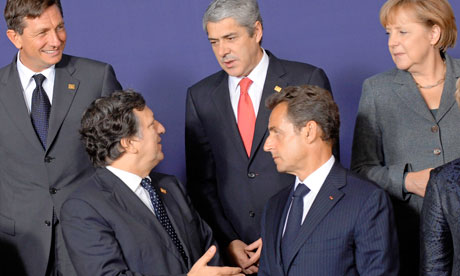Angela Merkel faces uphill battle to revise EU’s rules on bailouts
![]()
Angela Merkel struggling to win Europe-wide support for a major revision of EU law to underpin Greek bailout

Angela Merkel, the German chancellor, was struggling tonight to win widespread support across Europe for a major revision of EU law to underpin the multibillion-pound bailout of Greece.
A series of countries spoke out at tonight’s EU summit in Brussels against Merkel’s demand for voting rights to be withdrawn from member states that fail to meet strict eurozone fiscal rules.
The opposition, which came as David Cameron abandoned a campaign for a freeze in the EU’s £107bn budget for next year, means that Merkel is expected to win only a small revision of EU law.
The German chancellor, who had been hoping for a wholesale treaty revision, is expected to secure, at best, a change under a process known as the simplified revision procedure. This needs the agreement of all 27 EU member states but not a full inter-governmental conference, the usual process for revising treaties.
Merkel wants the changes to ensure a legally watertight underpinning of the €110bn bailout for Greece and the wider €750bn bailout for others. She fears the bailouts could be challenged in the German constitutional court unless they are codified in EU law.
Nicolas Sarkozy, the French president, had been wary of the German proposal. But he supported Merkel at a recent Franco-German summit after she agreed that the sanctions would not apply automatically and that the council of ministers could apply its discretion.
Berlin is proposing that voting rights should be withdrawn from member states that fall foul of the target in the growth and stability pact. These are to keep annual deficits no higher than 3% of GDP and to keep debt at no higher than 60% of GDP.
But the Dutch and the Scandinavians are angry at what they regard as the Franco-German stitch-up, as is the European commission. “I don’t like what I’m seeing. It’s very dangerous,” Viviane Reding, the EU’s longest-serving commissioner, told the Guardian.
“This should be a discussion of 27 [EU governments] and not a diktat of two. What is this unnecessary question of reopening the Lisbon treaty? We needed 10 years to get the treaty with all the difficulties that we know about.”
A senior German official said: “We’re only talking about changing two lines. We think that’s possible.”
Cameron is uneasy about treaty change because he had hoped that the Lisbon treaty would be the last attempt to revise the EU rulebook for some time. But he has told Merkel he can live with the change as long as Britain’s “carve out”, as a non-eurozone member, is respected.
The prime minister had hoped that his support for Merkel would help him in his battle to cut or freeze the EU budget next year. But he accepted that the budget would have to rise by at least 2.91% – requiring a British contribution of £435m – after Merkel and Sarkozy said they would stand by the council of ministers.
The prime minister, who held a trilateral meeting with Merkel and Sarkozy shortly after arriving in Brussels, won their support to fight the European parliament and European commission, which want to increase the budget by 6%.
A letter signed by the leaders of Britain, Germany, France and eight other EU countries said: “These proposals [for a 6% rise] are especially unacceptable at a time when we are having to take difficult decisions at national level to control public expenditure. The council has proposed an increase in EU budget spending of 2.91% for 2011. We are clear that we cannot accept any more than this.”
Yvette Cooper, the shadow foreign secretary, said: “David Cameron should have sorted this months ago instead of leaving it to last-minute grandstanding. He’s failed to work with other European governments on this and that’s making it harder to get a good deal for Britain now.
Related Articles
Humala claims victory in tight Peru poll
![]()
Partial official results show a narrow lead for leftist Ollanta Humala in presidential election Ollanta Humala celebrates initial victory in
Consecuencias de la decadencia estadunidense
![]()
Hace tiempo que argumento que la decadencia estadunidense en tanto potencia hegemónica comenzó circa 1970 y que el lento declive
Don’t Worry About A Romney Appointed Court
![]()
The March of Supreme Court Zombies by WILLIAM KAUFMAN Halloween has been over for nearly a week, but prepare yourselves


